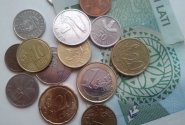
On Thursday, 13 December, the Saeima in the first reading supported in principle the Draft Law on the Introduction of the Euro, which sets forth general principles for the introduction of the common currency of the European Union – the euro – in Latvia. The Saeima deemed the Draft Law as urgent, and it is planned to be adopted in the final reading on 31 January of next year.
The Draft Law on the Introduction of the Euro was supported by 53 MPs, 35 were against and 1 abstained.
The new Draft Law provides for several measures to be taken regarding the exchange of cash and transfer currency, price marking of goods and services in two currencies, as well as adaptation of accountancy registers and financial markets.
Upon the introduction of the euro, it will be possible to use both Latvian lats and euros in cash transactions for a period of two weeks, but change will be given only in euros. After this period, lats will no longer be valid for transactions, and the only legitimate currency used for payment will be the euro. As of the day of introduction of the euro, lats will also no longer be available from ATMs.
It will be possible to exchange lats for euros at credit institutions for a period of six months without an additional fee; the Bank of Latvia will exchange lats for euros without limits regarding time or amount, while service points of the Latvian Postal Service will exchange lats for euros for a period of one month. Assets in lats in bank accounts will be converted to euros automatically.
In order to give merchants time to adapt cash registers and relevant systems to the euro, it is planned to have a period during which prices will be marked in both currencies. Prices of goods and services will have to be shown in both lats and euros for three months before and six months after introduction of the euro. Likewise, amounts will be shown in both currencies on transaction documents, such as receipts and invoices.
According to the Draft Law, during conversion of lats to euros, the amounts of money in euros will be approximated to the nearest euro cent based on the value of the third digit after the decimal point – if it is from nought to four, the value at the cent level remains unchanged, and if it is between five and nine, the value is rounded up to the next cent. These rules will also apply to conversion of prices of goods and services. Compliance with the rules will be monitored by the Consumer Rights Protection Centre (CRPC).
As of the day of introduction of the euro, all entries in accounting records will have to be made in euros. The same applies to the annual reports and financial statements for the year that ends on the day of introduction of the euro.
According to the convergence report on Latvia’s compliance with the Maastricht criteria, the day of introduction of the euro will be determined by the Council of the EU, following a formal invitation to join the euro area extended to Latvia by the Council. It is planned to substitute the national currency with euros as of 1 January 2014. The Ministry of Finance has provided data according to which the central euro exchange rate to be determined by the Council of EU in summer 2013 is not expected to deviate significantly from the current rate, which is 0.702804 lats per euro.
During the Budget and Finance (Taxation) Committee meeting devoted to the Draft Law, Dace Kalsone, Head of the Euro Project at the Ministry of Finance, informed MPs about measures to counter unjustified price increase, such as monitoring of prices at points of sale, banks and service providers, as well as control measures to be implemented by the CRPC. It is also planned to urge entrepreneurs to refrain from raising prices and to take part in the campaign “Honest transition from lats to euros”.
Saeima Press Service







